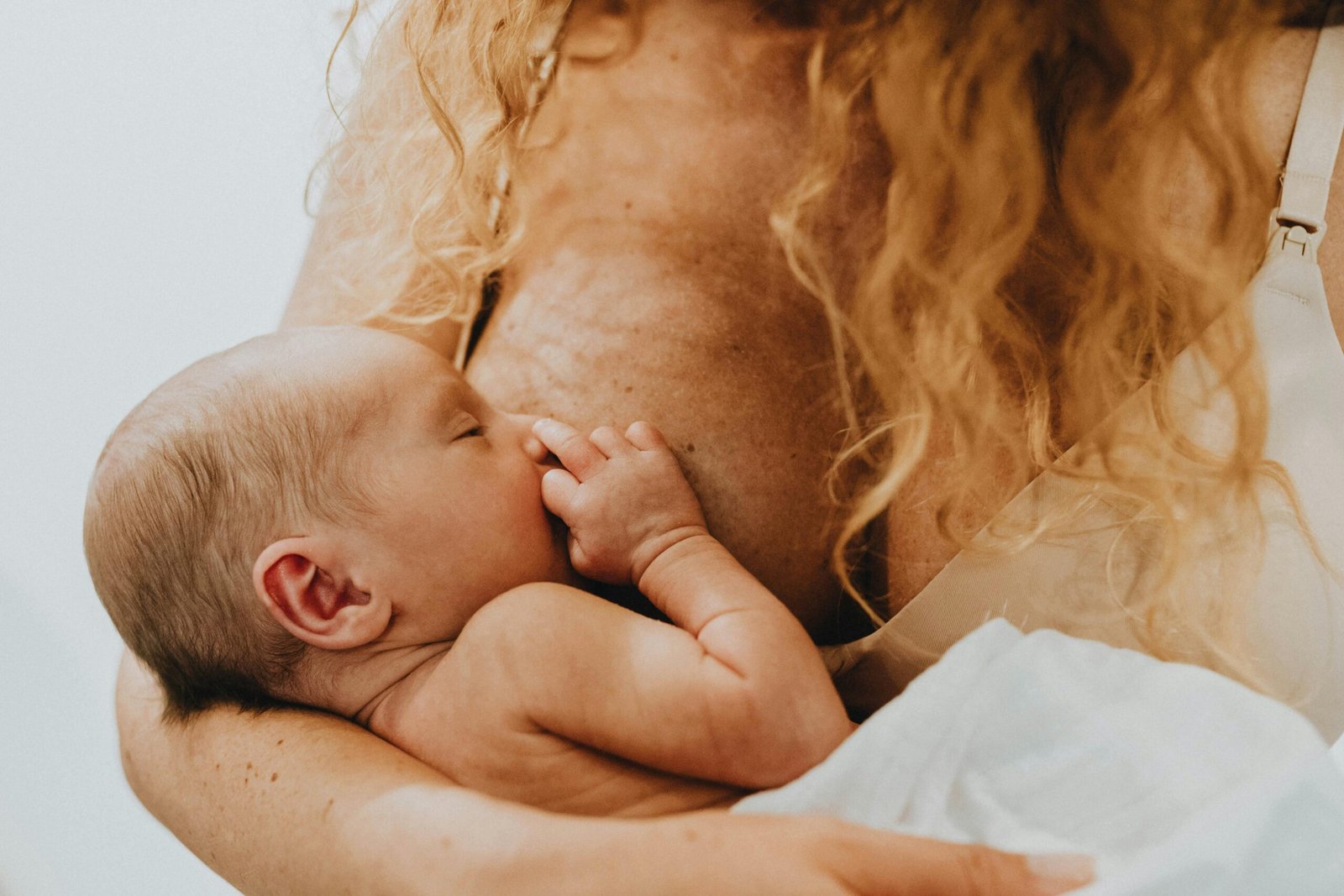Congratulations! You’ve welcomed your little one into the world, and now you’re navigating the wild, wonderful, and sometimes exhausting journey of motherhood. Between late-night feedings, diaper changes, and the never-ending snuggles, you might be wondering: Is postpartum weight loss while breastfeeding actually possible?
The short answer? Yes! But, like all things in motherhood, it’s a bit more complicated than just counting calories and hitting the gym. Let’s break it down and see how you can safely and effectively lose weight while nourishing your baby.
How Breastfeeding Affects Postpartum Weight Loss While Breastfeeding

You may have heard that breastfeeding helps you lose weight. After all, it burns calories—about 300 to 500 per day! But before you start picturing yourself magically shedding pounds while binge-watching your favorite shows with a baby on your chest, there’s more to the story. Breastfeeding can help some moms return to their pre-pregnancy weight faster, but others may find it tricky. Your body is designed to hold onto some fat stores to ensure you have enough energy to keep up with milk production. Hormones also play a role in how quickly or slowly your body releases weight. If you’re exclusively breastfeeding, your body prioritizes milk supply over fat loss, meaning the scale might not budge as quickly as you’d like.
Nutrition Tips for Postpartum Weight Loss While Breastfeeding
One of the most important things to remember is that you’re feeding your baby, not just yourself. That means restricting calories too much can mess with your milk supply. Instead of focusing on eating less, focus on eating better. Start with nutrient-dense foods that keep you full and energized. Lean proteins, whole grains, fruits, veggies, and healthy fats should be your best friends. Hydration is also key—drink plenty of water, especially if you feel hungrier than usual. Sometimes, thirst disguises itself as hunger, and drinking enough water can keep unnecessary snacking at bay.
The Best Exercises for Postpartum Weight Loss While Breastfeeding
The good news? You don’t need to go all out with intense workouts to start seeing progress. In fact, gentle movement can do wonders for postpartum recovery and weight loss.
Start slow with activities like walking, stretching, or postpartum yoga. Once you feel ready, gradually add strength training and cardio exercises. The key is consistency. Even if you’re squeezing in short workouts while your baby naps, it all adds up!
Listen to your body—especially if you had a C-section or complications during delivery. Your core and pelvic floor muscles need time to heal, so be kind to yourself. If anything feels off, slow down and consult your doctor.
Can You Lose Weight Without Hurting Your Milk Supply?
Absolutely! The trick is finding the right balance. Losing weight too quickly (more than 1-2 pounds per week) can cause your milk supply to drop. To keep your milk flowing while losing weight, make sure you’re eating enough nutritious food and not over-exercising.
Pay attention to signs that your supply might be decreasing, like fewer wet diapers, a fussy baby who seems hungry all the time, or a noticeable drop in milk production. If this happens, increase your calorie intake slightly and focus on hydrating more.
Common Mistakes Moms Make with Postpartum Weight Loss While Breastfeeding

One big mistake? Cutting calories too aggressively. Remember, your body needs extra energy to make milk. If you’re under-eating, your body might hold onto fat instead of letting it go.
Another mistake is not getting enough rest. Easier said than done, right? But sleep plays a huge role in weight loss. When you’re exhausted, your body craves sugary and high-calorie foods for quick energy. Plus, lack of sleep messes with hunger hormones, making you feel hungrier than you actually are.
And let’s not forget stress! Motherhood is wonderful, but it can also be overwhelming. Stress increases cortisol levels, which can lead to weight gain (or make losing weight harder). Find ways to manage stress—whether it’s deep breathing, a few minutes of quiet time, or asking for help when you need it.
The Emotional Side of Postpartum Weight Loss While Breastfeeding
Let’s be real—postpartum bodies are different. Even if you lose all the baby weight, your body may not look or feel the same as before. And that’s okay! Your body just did something incredible—it grew and birthed a whole human.
Instead of obsessing over the scale, focus on feeling strong, healthy, and energized. Celebrate small victories, like fitting into your favorite leggings again or making it through a workout without feeling like a zombie. Give yourself grace, and remember that you are amazing just as you are.
What If the Weight Just Won’t Budge?
Sometimes, despite your best efforts, postpartum weight loss while breastfeeding feels impossible. If that’s the case, consider:
- Checking your nutrition: Are you eating enough protein and healthy fats? Too many processed carbs?
- Evaluating your workouts: Are you moving enough without overdoing it?
- Stress and sleep: Are they sabotaging your efforts?
- Talking to a professional: A doctor, dietitian, or postpartum fitness expert can help you troubleshoot.
Remember, every body is different, and what works for one mom might not work for another. Be patient with yourself!
The Bottom Line on Postpartum Weight Loss While Breastfeeding
Losing weight while breastfeeding is possible, but it takes time, patience, and a balanced approach. Instead of rushing to “bounce back,” focus on nourishing yourself, moving your body, and giving yourself grace. Your body is doing something incredible—feeding your baby—so treat it with kindness. Take it one step at a time, celebrate the small wins, and most importantly, enjoy these precious moments with your little one. The weight will come off in time, but these snuggles? They won’t last forever!
Frequently Asked Questions: Postpartum Weight Loss While Breastfeeding: Is It Possible?
1. Can I Lose Weight While Breastfeeding Without Hurting My Milk Supply?
Absolutely! It’s a delicate balance, but totally doable. Your body is already working overtime producing milk, which burns about 300-500 calories a day, so you’re naturally expending more energy than usual. The key is to lose weight gradually—think slow and steady, like a lazy river, not a rushing waterfall. Extreme dieting or cutting too many calories too fast can send signals to your body that food is scarce, potentially impacting milk production.
Instead of drastic calorie slashing, focus on nutrient-rich foods, staying hydrated, and eating when you’re hungry (not when you’re just tired, which happens a lot postpartum). Pair that with gentle movement like walking or stretching, and your body will find its balance.
2. How Many Calories Should I Eat to Lose Weight but Still Breastfeed Successfully?
You need a little extra fuel while breastfeeding, so don’t go diving into a 1,200-calorie diet expecting miracles. Most breastfeeding moms do well with around 1,800-2,200 calories a day, but that number depends on your activity level and metabolism. If you’re constantly running after a toddler while nursing a newborn, you might need more. The best approach? Listen to your body.
If you’re feeling sluggish, cranky, or noticing a drop in milk supply, it’s a sign you might not be eating enough. Instead of counting every bite, focus on nutrient-dense foods—protein, healthy fats, fiber-rich carbs—so every meal is satisfying and keeps you energized.
3. Will Exercise Affect My Breast Milk or Make It Taste Bad?
This is a classic worry, and it makes sense—if intense workouts make sweat taste salty, could they also change the taste of your milk? Technically, high-intensity workouts can slightly increase lactic acid in breast milk, but unless you’re training like an Olympic athlete, your baby won’t even notice.
If they suddenly refuse the boob right after you work out, try nursing first or rinsing off the sweat—it’s usually the salty skin they dislike, not the milk itself. Moderate exercise, like walking, yoga, or even dancing around the living room, won’t affect your supply at all and can actually boost your energy levels and mood.
4. What Are the Best Foods to Eat for Postpartum Weight Loss and Milk Production?
Think of your meals as a combination of “baby fuel” and “mom fuel.” You need foods that keep milk production steady while helping you feel satisfied and energized. Protein is your best friend—chicken, fish, eggs, tofu, lentils. Healthy fats, like avocado, nuts, seeds, and olive oil, keep you full longer.
And don’t forget fiber! Whole grains, beans, and loads of veggies help with digestion (because let’s be real, postpartum digestion can be a struggle). Instead of skipping meals or grabbing random snacks, plan easy, one-handed options: a smoothie packed with spinach, banana, peanut butter, and oats or overnight oats with flaxseeds and berries.
5. How Can I Tell If My Weight Loss Plan Is Affecting My Baby’s Nutrition?
Babies are excellent at letting you know when something’s off. If your little one seems fussier than usual, isn’t having enough wet diapers (at least six a day), or isn’t gaining weight as expected, your milk supply might be taking a hit. But before you panic and start eating double portions, remember that occasional dips in supply can happen due to stress, dehydration, or even a missed feeding.
Stay hydrated, eat balanced meals, and nurse frequently. If you’re worried, track your baby’s diaper output and growth, and talk to your doctor or a lactation consultant for peace of mind.
6. Is There a Safe Way to Lose Baby Weight Without Feeling Starved?
Yes, and it doesn’t involve eating like a rabbit! The trick is to eat in a way that keeps you full and satisfied, so you’re not battling cravings all day. Make sure your meals have a balance of protein, healthy fats, and fiber-rich carbs. Instead of skipping meals (which leads to late-night fridge raids), focus on small, frequent meals that keep your blood sugar stable.
And don’t forget hydration—sometimes what feels like hunger is actually thirst, and breastfeeding makes you need more fluids than usual. Aim for water, herbal teas, or smoothies, and limit sugary drinks that might spike energy but leave you crashing later.
7. How Long Does It Take to Lose Weight After Having a Baby While Breastfeeding?
This is where patience is key. Some women drop weight quickly without trying, while others hold onto a few pounds until they wean. Both are totally normal! Your body just went through something major, and it needs time to recover. A healthy, sustainable pace is about 1-2 pounds per week.
If it takes six months or even a year to reach your pre-baby weight, that’s okay. Instead of focusing solely on the number on the scale, pay attention to how you feel—more energy, better sleep (well, as much as possible with a newborn), and feeling stronger. Your body is adjusting, and as long as you’re nourishing yourself and staying active, the weight will come off when it’s ready.
